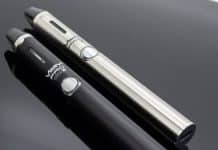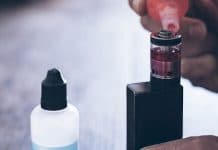
If you’ve ever found that when you were vaping you simply couldn’t identify which flavour e-juice you were using, the chances are that you’ve been suffering from vaper’s tongue.
After vaping for some time, vapers often unexpectedly and suddenly stop being able to taste the flavour of their vape juice.
There’s no need to panic though! It’s a temporary problem which you can easily remedy.
Here, we’ll look at how you can get rid of vaper’s tongue and how to prevent it in the first place.
What is Vaper’s Tongue
The term “vaper’s tongue” is used to describe a situation where vapers suddenly find they can no longer taste their vape juice.
Almost every vaper will have this experience at some point, and while it usually only lasts for a couple of days, it can last as long as two weeks.
If you’ve ever felt that your tongue has developed a coating which blocks your ability to taste, you’ve got vaper’s tongue!
It won’t stop nicotine from being absorbed or vapour from being produced, but it will stop you from enjoying the flavour of your favourite e-liquid and that can stop you from deriving as much pleasure from your vaping experience.
What Can Cause Vaper’s Tongue?
There are several known causes of vaper’s tongue. These include:
- Dehydration – we need sufficient saliva to maintain our tastebuds’ functionality. Vaping excessively causes dry mouth and causes the salivary gland function to reduce. When there is insufficient saliva to keep the mouth moist, the taste can be temporarily lost.
- Vaping the same flavour for too long – the longer you vape one flavour, the less you’re likely to be able to taste it. Switch to a different flavour for a couple of days, then return to your old favourite and you should find you can enjoy it again.
- Damaged taste buds – sometimes, damage can occur to the tastebuds. Infections, smoking, sour or spicy foods and alcohol can all cause damage which prevents you from tasting your e-juice. Eventually, the tastebuds will heal and your sense of taste will return to normal.
- Olfactory issue – the sense of smell and sense of taste work together to help us to identify different flavours. If your sense of smell isn’t working properly you won’t be able to taste your e-juice properly either.
- Smoking – smokers and recent ex-smokers may find their ability to smell and taste is negatively affected. After you quit smoking entirely, it usually takes around a month for this symptom to disappear.
- Ageing E-liquid – if your e-juice is old, its taste can deteriorate, developing an unpleasant, peppery flavour. Try switching to a new one and see if the problem resolves itself.
- Medicines – some medications can cause you to lose your sense of taste. These include some cancer treatments, rifampin, procarbazine, penicillamine, lithium, griseofulvin, captopril and thyroid medications.
How to Avoid Vaper’s Tongue?
You can prevent yourself from developing vaper’s tongue by taking the following steps:
- Drink more water – dehydration is perhaps the most common cause of vaper’s tongue, so drink more water to ensure your salivary glands are working properly and your mouth remains moist.
- Reduce your caffeine and alcohol – alcohol and caffeine are both diuretics which speed up the process of dehydration. As a result, a dry mouth can occur. Drink less of both and you should avoid vaper’s tongue.
- Stop smoking – cigarettes and tobacco contain many ingredients which damage oral health. If you quit smoking, your mouth will be able to function correctly and you’ll be able to taste your e-juice with no problems.
- Clean your tongue – when you brush your teeth, you shouldn’t forget to clean your tongue too. This reduces the amount of damage caused to your tastebuds by the bacteria that results from food residues. Also, the cleaner your tongue, the better your vaping experience.
What to Do to Get Rid of Vaper’s Tongue?
If you already have vaper’s tongue, here are some things you can try to rid yourself of the problem:
- Use an oral hydration product – products like Biotene are oral hydration products which cure dry mouths temporarily. You can buy these products in several formats such as toothpaste, gel, spray and mouthwash.
- Switch up the e-juice – if you always vape your favourite flavour, it’s time to try a different one. Your olfactory senses are only able to tune into that one aroma for a certain amount of time before giving up. If you experiment with a different flavour, you’ll find you can enjoy your regular one again when you return to it later.
- Extending the time interval – are you a chain vaper? If so, that’s going to take its toll on your smell receptors and tastebuds. You should increase the amount of time you go between vapes. You may be able to achieve this if you choose a higher nicotine level for your e-juice as you will stay satisfied for longer with no need for another hit.
- Try a mentholated or cooling flavour – menthol is known to activate your thermoreceptors without even requiring a sense of taste or smell to be experienced. This is why cooling e-juices reset the tastebuds so you can get back to normal and start enjoying your favourite flavours again.
- Unflavoured juices – another option is to vape an unflavoured base. It’s a bit like taking a break from vaping but you don’t have to stop getting your nicotine hit. Unflavoured e-juices have very little taste – only a slightly sweet flavour – and you can find it in a range of PG/VG ratios and nicotine levels. As unflavoured e-liquids are also cheap, this is an extra bonus.
What to Do if Vaper’s Tongue Persists?
If you’ve tried all these methods and still find you’re suffering from vaper’s tongue, you may have a more severe underlying problem.
Around 70% of people take prescription medications which have dry mouth as a side effect.
Common medications for treating anxiety, depression, colds and allergies, among other illnesses, result in a dry mouth.
Therefore, if you find the problem is persisting despite your best efforts to relieve it, you should see your dentist or doctor to rule out an underlying issue.










